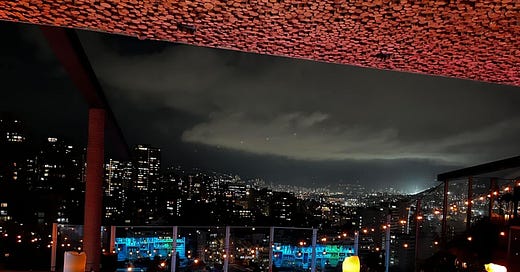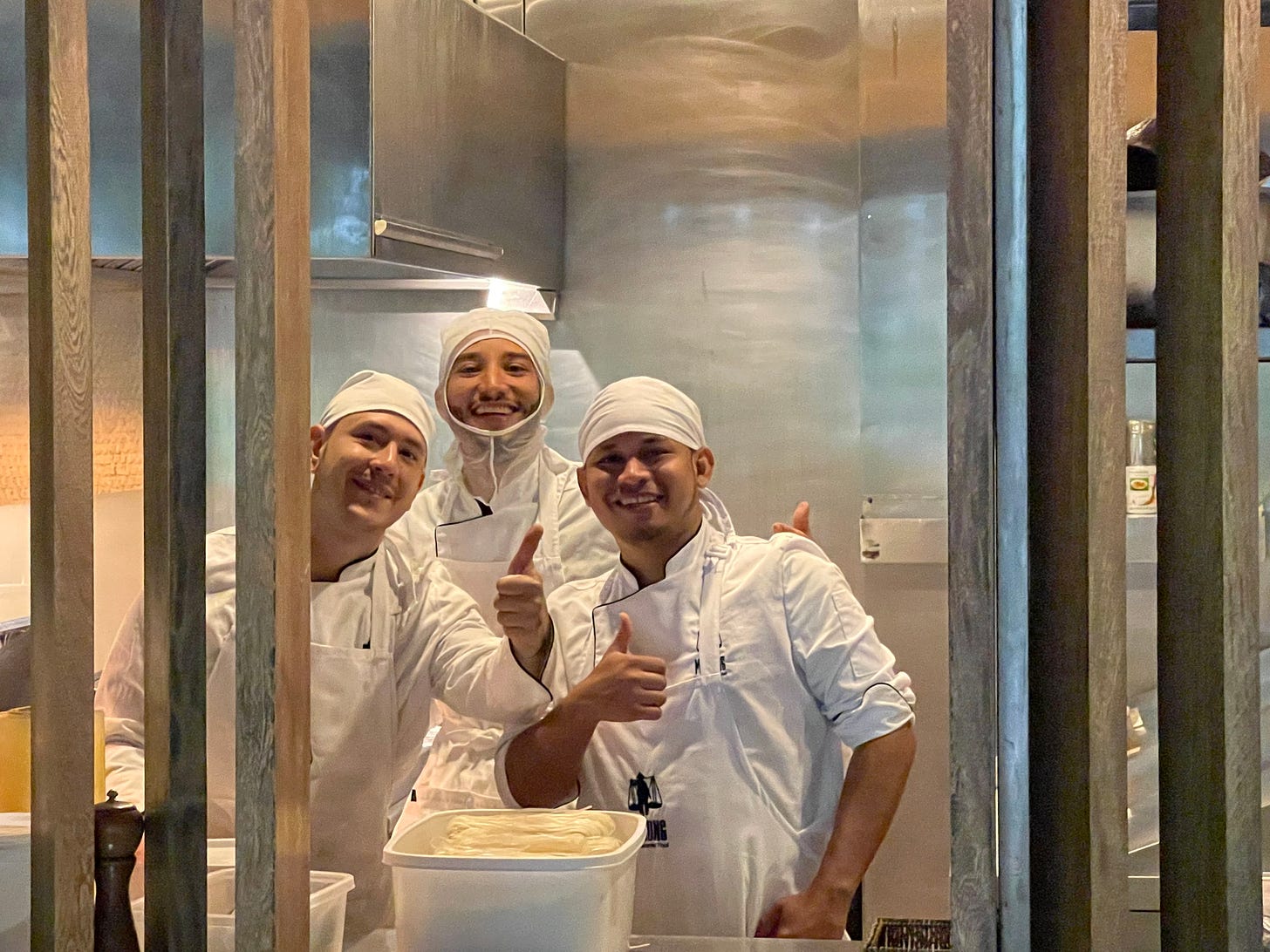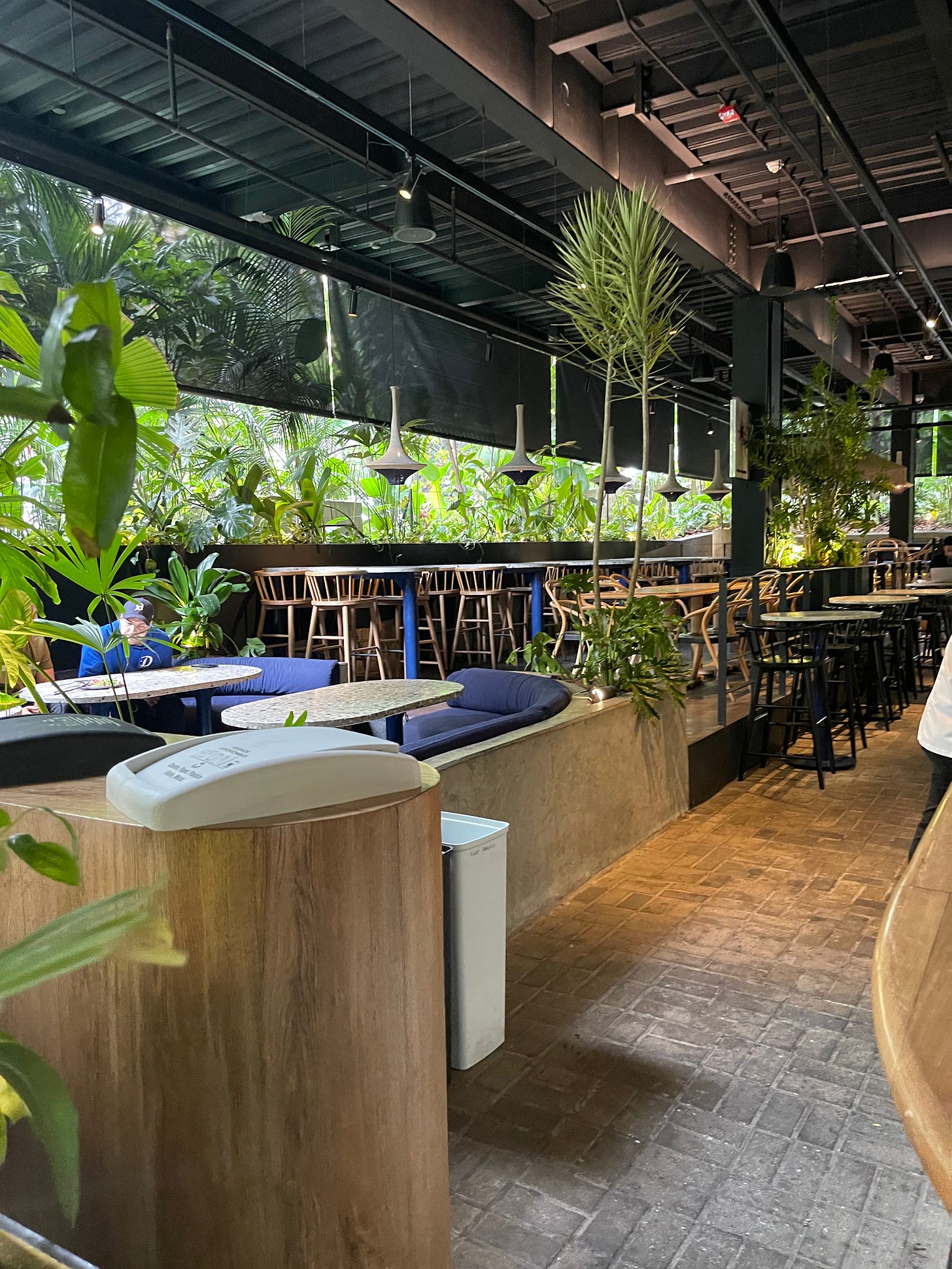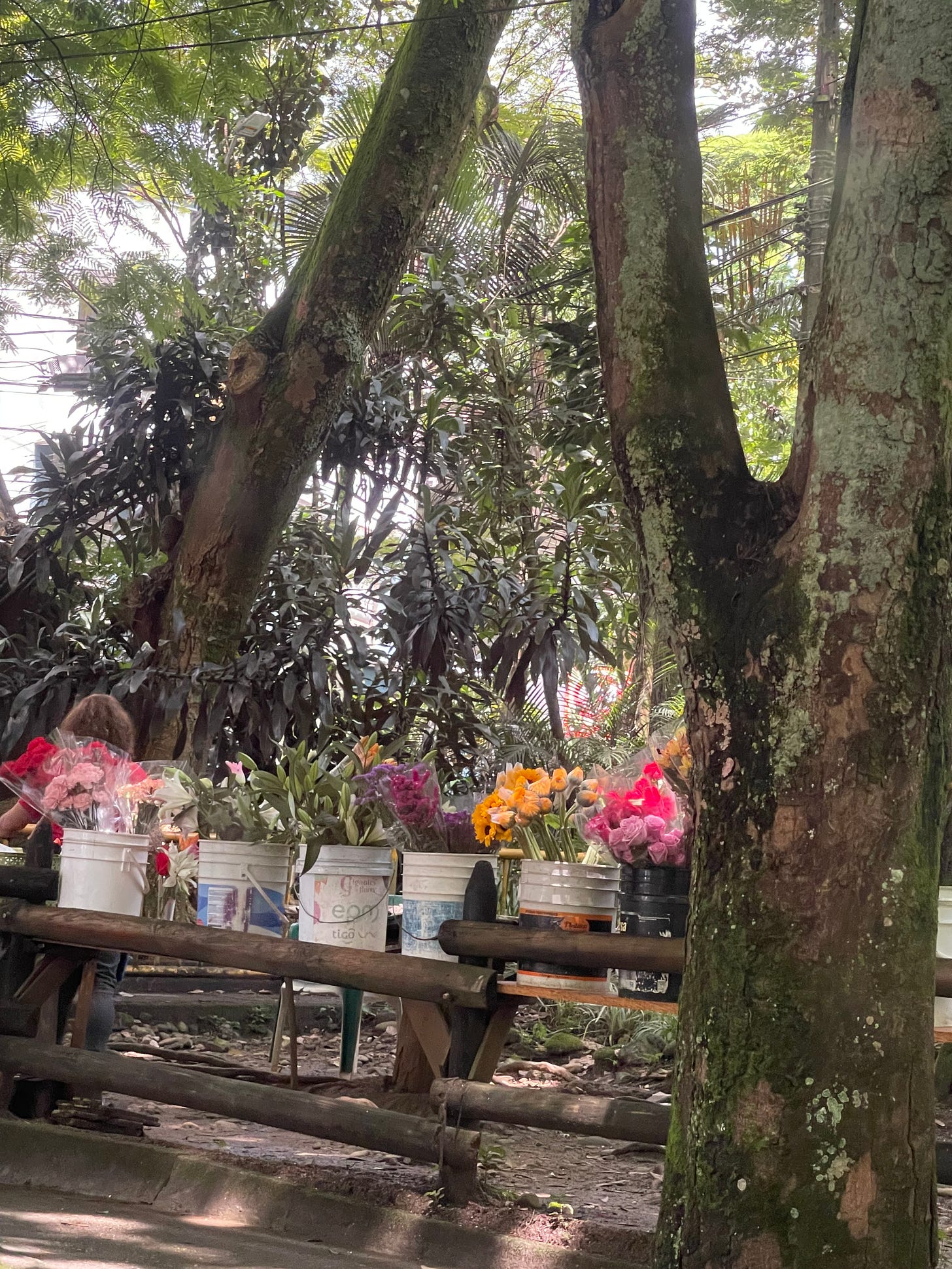Que mas?
What’s happening in Medellin, hipster capital of the blank-vote paisas, eco dreams and green scarves.
9.3.22 I’m back in the green jewel mountain city of Medellin, in Colombia, where the temperature is never too high, and never too low, which is why so many Americans, millennial and retirees, have flocked here. They are lured by the weather, and the lush green mountains dotted by tropical lush amazonas-like palms and flowering trees and forests of pine. Colombia is a main exporter of flowers, including orchids. When I first visited 25 years ago, for my older brother’s wedding, it was the time of narco warlord Pablo Escobar, and locals warned me about walking around Medellin. There was cartel violence and daytime kidnappings; the citizens felt unsafe.
Now I’m back for the wedding of my brother’s daughter, and the city and country and its politica have been radically transformed. Medellin is, and has been, totally happening. It’s bursting with energy and new business, and remains a digital nomad center, and the top place for US early retirees, apparently. It has a tourist area, Poblado, vying for a 24-hour Vegas vibe of restaurants, shops, dancing and fun. Que mas? the paisas greet each other, what’s going on? How’s it going? A paisa is someone from the northwest of Colombia, but also a stand-in word for culture. I always try to learn as much slang as I can, because, well, it's fun. So, I’m going to sprinkle in some paisa words here, to give you a taste of it.
When I travel, I engage in what I call casual, chit-chat journalism, or taxi or street anthropology. I talk to baristas and servers and taxi drivers and the people hired to clean up after the tourists in hotels and elsewhere. I like to know how those with less are faring, and how the national narrative syncs up -- or doesn’t -- with their reality and vision of the future.
Young chefs in Medellin.
There are so many different kinds of paisas living in Colombia, and it’s immediately evident that some are very rich and others extremely poor, including the indigenous poor from the north who speak local languages. They have been driven from fertile farmlands and coffee mountains by drug cartels demanding that they grow coca instead of food they can eat. The country also welcomes daily waves of refugees from next-door Venezuela, where the brutal Covid-denialist and dictator president, Duarte, has run his country into the ground. That doesn’t mean Colombia is a haven for new refugiados, but a place where many displaced people who have lost everything are trying to get by until Venezuela regains its sanity. Last time I was here, in June, a driver I had was a surgeon who moonlighted for Uber; another was a nurse who managed an entire hospital nursing department back in Venezuela. Here, she worked as an elder nanny because she has a child and can’t work the required 12-hour shift for a hospital nurse.
Que mas? Nada es facil for these refugees, but they are grateful. We are alive, the nurse tells me. Everyone who can has left. I can work here, and dream of going home.
A little background is useful here. Columbia, unlike it’s formerly richer neighbor Venezuela, is traditionally a poorer, mountainous country, and the poorest are indigenous farmers and residents of the north. Colombia has fertile land; its main exports are minerals, oil, flowers and coffee. The fresh flowers cut at dawn are sold in flower markets across Colombia, its famous delicate orchids carefully stacked in refrigerated airplanes and flown fast to Miami and Texas and Europe and everywhere.
Bogota is the capital, but everyone I chit-chat with in Medellin turns a nose up at it, calling it gonorrea, which is a word reserved for something very unpleasant. The capital is cold and traffic is so horrible, they complain; people only live there for work and higher salaries because the embassies and government jobs are there. Medellin, they argue, proud paisas, is the nicer big city.
Click Clack hotel, Medellin
Bogota is also where a new president, its former mayor, is shaking up Latin American politics, alongside his pioneering Afro-Colombian female vice-president, Francia Marquez, a former maid who used to sleep on the floor as a child. She’s outspoken and politically astute. Her selection is a sharp rebuke to the class divisions in Colombia, and a sign of the shifting winds. News articles around the world have profiled both of them as a bold new page for the region—and world –and a controversial choice for Colombia. Marquez has become a modern fashion icon, ditching her prior jeans and T-shirt uniform for bright African print dresses by local gay designers her former poor neighborhood. All not-so-subtle political statements Colombians cheer.
Gustavo Petro is a serious lefty, and paisas are divided about how much of a lefty he will be. He infamously joined the M-19 popular guerillera, which routed a then-dictator, Gustavor Rojas Pinella. M-19 gamed fame in the 1990s but also notoriety for its armed struggle. Petro later broke from M-19 to join the Alternative Democratic Pole (PDA) and later the Humane Colombia movement. He vowed to tackle systemic inequity and take on the cocaine cartels. He lost the presidency twice before narrowly winning this spring.
His victory frightens some in the private sector and conservatives, who consider him a lefty in the mold of his late parce, or friend, Hugo Chavez, who infamously nationalized Venezuela’s oil sector. Petro has worked to reassure them but is determined to shift Colombia’s dependence on oil to a greener economy. He’s also pushed to bring indigenous and Black Colombians into greater participation and benefit in Colombia’s burgeoning future. For her part, VP Marquez has minced no words calling out the traditional machismo of Colombia and demanding greater support for women’s rights. Petro calls himself a feminist and backed the creation of a Ministry of Equality to fast-track women’s rights. He has backed abortion rights – an evolving position (after critique by feminists)– and has worn a green scarf to signal his support. He also champions LGBTQ rights, including trans rights. All of this is an affront to traditional Catholic Colombia, but in fact, many Catholics here are tacit social progressives, and are pushing the church to evolve and remain relevant, too.
The bigger threat to his critics – and exciting possibility to many – is Petro’s ambitious war on drugs, which he sees as a critical step to liberating Colombia from the violent grip of the cartels. He wants to decriminalize and regulate drugs, including cocaine, a position shared by the left-leaning ally presidents of Peru and Bolivia. They’ve jointly called for this radical step as the only solution after decades of a failed US war on drugs, one sure to hugely benefit the US, too, helping to stem the outflow of immigrants toward its southern border.
So, que mas? How are people doing? Are people happy with bold Petro? No, claims an Uber driver who took me from Poblado to Laureles, a leafy suburb that I prefer. It’s also dotted with airy restaurants and shop, but it quieter. Here, the paisas are actually locals, not wanna-be-gringistas. Huge, sinewy, fat-trunk tropic trees rise above the streets; flowers are everywhere. It’s beautiful. I’m a voto blanco, he told me. That’s a term for none of the above, the legal vote option he chose in the last election, along with a lot of other citizens. Among his parces, they aren’t happy with either the right or the left in Colombia. The voto blanco says a lot about the uncertainty and political ambivalence that Colombians like him feel about the direction of the country. They are thrilled with the economic gains, but afraid Petro will nationalize the oil like Chavez. They support drug decriminalization, but wonder what will replace it? Will the cartels give up so easily? Will a new armed war break out? Will it help or hurt the next generation of Colombia youths who succumb to cocaine addiction?
I have no real voice, the driver tells me. Meaning, he can vote, yes, but doesn’t see his candidate. The voto blanco is his small act of protest. When I tell him that a lot of America feels that way now, he nods. Trump, he agrees with me, giggling, is gonorrhea. He follows the US news closely. He trained in economics but lacks the capital to open his own business. It’s hard without the right connections, he says. Plus, the gig economy of Uber is a better fit for him. He can set his own hours, be his own jefe. He makes about $1000 a month, working a good 8-hour day. That’s about $4000 to $5000 by American standards. Colombians are embracing the gig paisa, and tech is another economic driver. He foresees a huge growth in the greening of Colombia, which is embracing environmentalism.
He’s also hopeful that if Petro adopts a more central-left policy, the crime that is linked to urban drug activity will continue to fall, another positive direction. He admires Francia Marquez, a former maid who backs STEM education and is backed by NASA, he proudly adds; she’s super-smart and clearly organized. He also agrees that Afro-Colombians need a greater boost and spotlight. He does like the class shakeup she represents. He has children in his 20s. Now girls can imagine being president. He gives me a thumbs-up. Eso es bueno.
Que mas, por Colombia?
As we drive out of Poblado, he points out the fashion shops, the better restaurants, the big parks, the low clouds that drop quick buckets of rain in the afternoon and quickly move away. We slow for the corner flower market, the vendors hawking big bowls of fresh fruit: mango, guaya, otro. My country is so beautiful, he says. I’m doing okay. Things are much better than the past. We have been blessed with a natural paradise. I don’t want to live anywhere else.
As for me, he's happy I’m here for a wedding. He hopes I’ll go dancing, recommends his favorite salsa places. Here, we work but we also dance, he says, smiling. Musica. Baile. Parces. Familia. Eso es la vida.
Last night, late: La autora, (left), with her nieta y primo, bailando on the stage of La Chiquita, un gay bar en Poblado lleno de paisas. Que mas? Felicidad.
foto: credit Claudia Berthoin, 2022.
Colombia cocaine: Petro pursues decriminalization - The Washington Post
Francia Márquez Has Just Become Colombia’s First Black Vice President - The New York Times (nytimes.com)










This makes me want to go there!
lovely, so interesting